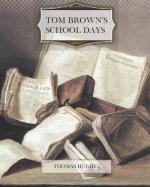I don’t mean to say it would be the case in all villages, but it certainly was so in this one: the village boys were full as manly and honest, and certainly purer, than those in a higher rank; and Tam got more harm from his equals in his first fortnight at a private school, where he went when he was nine years old, than he had from his village friends from the day he left Charity’s apron-strings.
Great was the grief amongst the village school-boys when Tom drove off with the Squire, one August morning, to meet the coach on his way to school. Each of them had given him some little present of the best that he had, and his small private box was full of peg-taps, white marbles (called “alley-taws” in the Vale), screws, birds’ eggs, whip-cord, jews-harps, and other miscellaneous boys’ wealth. Poor Jacob Doodle-calf, in floods of tears, had pressed upon him with spluttering earnestness his lame pet hedgehog (he had always some poor broken-down beast or bird by him); but this Tom had been obliged to refuse, by the Squire’s order. He had given them all a great tea under the big elm in their playground, for which Madam Brown had supplied the biggest cake ever seen in our village; and Tom was really as sorry to leave them as they to lose him, but his sorrow was not unmixed with the pride and excitement of making a new step in life.
And this feeling carried him through his first parting with his mother better than could have been expected. Their love was as fair and whole as human love can be—perfect self-sacrifice on the one side meeting a young and true heart on the other. It is not within the scope of my book, however, to speak of family relations, or I should have much to say on the subject of English mothers—ay, and of English fathers, and sisters, and brothers too. Neither have I room to speak of our private schools. What I have to say is about public schools—those much-abused and much-belauded institutions peculiar to England. So we must hurry through Master Tom’s year at a private school as fast as we can.
It was a fair average specimen, kept by a gentleman, with another gentleman as second master; but it was little enough of the real work they did—merely coming into school when lessons were prepared and all ready to be heard. The whole discipline of the school out of lesson hours was in the hands of the two ushers, one of whom was always with the boys in their playground, in the school, at meals—in fact, at all times and every where, till they were fairly in bed at night.
Now the theory of private schools is (or was) constant supervision out of school—therein differing fundamentally from that of public schools.
It may be right or wrong; but if right, this supervision surely ought to be the especial work of the head-master, the responsible person. The object of all schools is not to ram Latin and Greek into boys, but to make them good English boys, good future citizens; and by far the most important part of that work must be done, or not done, out of school hours. To leave it, therefore, in the hands of inferior men, is just giving up the highest and hardest part of the work of education. Were I a private school-master, I should say, Let who will hear the boys their lessons, but let me live with them when they are at play and rest.




